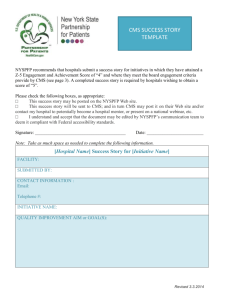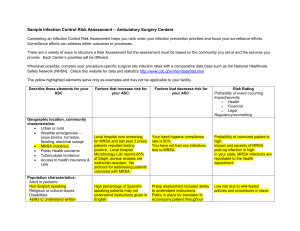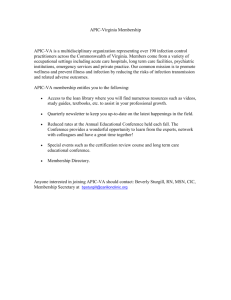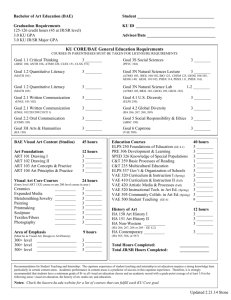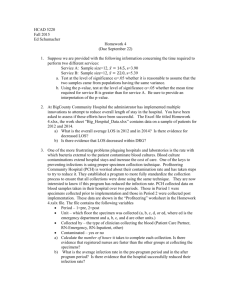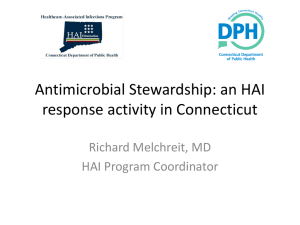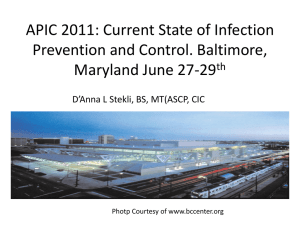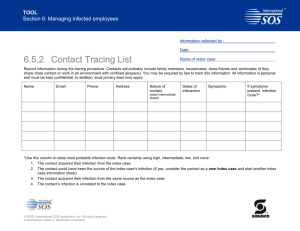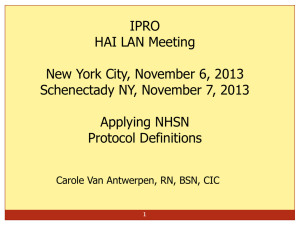A Riddle wrapped in a Mystery Inside an Enigma: NHSN
advertisement
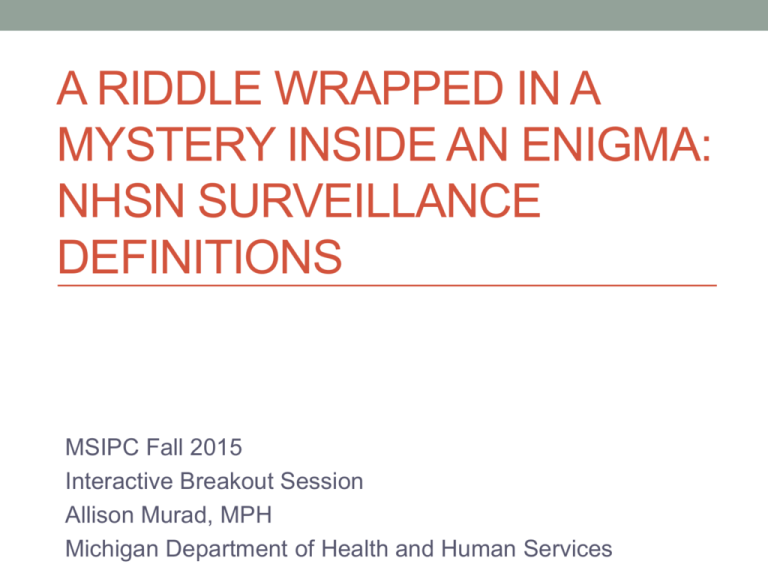
A RIDDLE WRAPPED IN A MYSTERY INSIDE AN ENIGMA: NHSN SURVEILLANCE DEFINITIONS MSIPC Fall 2015 Interactive Breakout Session Allison Murad, MPH Michigan Department of Health and Human Services Disclosures • I have nothing to disclose Interactive Session • Quick review of surveillance definitions and changes • Real case studies sent from hospitals like yours! Reporting Reminders • Always refer to the protocol! • For NHSN reporting, surveillance determinations “trump” clinical judgement • Clinical diagnoses are important for treatment of individual patients • Surveillance definitions are important in identifying trends within a population • Concerns should be sent to nhsn@cdc.gov instead of not reporting or facility adjudication CMS Reporting Review • CLABSI: Adult, Pediatric, and Neonatal ICUs; Adult and Pediatric Medical, Surgical, and Medical/Surgical Wards • CAUTI: Adult and Pediatric ICUs; Adult and Pediatric Medical, Surgical, and Medical/Surgical Wards • SSI: COLO and HYST Procedures • MDRO/CDI: MRSA Bacteremia and CDI LabID (FacWideIn, ED, Obs) CMS Reporting Review • Medicare Beneficiary Number for all Medicare patients reported into NHSN • Healthcare Personnel Influenza Vaccination data for all Inpatient Healthcare Personnel NHSN DEFINITIONS POA vs. HAI • Present on Admission (POA): date of event occurs on the day of admission or the day after admission (day of admission, 2 days before, day after) • Healthcare-Associated Infection (HAI): date of event occurs on or after the 3rd calendar day of admission New in 2015 • DOE: Date of Event (Not for VAE or LabID). Date the first element used to meet the CDC NHSN site-specific infection criterion occurs for the first time within the seven day infection window period • Infection Window Period (Not for SSI, VAE, or LabID): a seven day period during which all site-specific infection criterion must be met. It includes the date of the first positive diagnostic test that is an element of the sitespecific criterion, 3 calendar days before and 3 calendar days after New in 2015 • Repeat Infection Timeframe (RIT) (Not for SSI, VAE, or LabID): 14-day period during which repeat infections of the same type will not be reported to NHSN. If additional sitespecific specimens are collected within the RIT and new pathogens are identified, those pathogens should be added to the original infection. • Secondary BSI Attribution Period (Not for SSI, VAE, or LabID): time period during which a BSI can be attributed as secondary to another infection site, if all other required guidelines (i.e. Secondary BSI Guideline) are met. The time period will include the IWP of the primary infection as well as that infection’s RIT and will vary from 14-17 days depending on date of event. No Longer Used in NHSN Surveillance • Gap Days concept to determine criterion met • Logical pathogens to determine secondary BSI • Date of Event = Date of last element CLABSI CLABSI Reporting – New in 2015 • Report CLABSI from all adult, pediatric, and neonatal: • ICUs • Medical Wards • Surgical Wards • Medical/Surgical Wards BSI Key Term • Central Line: Intravascular catheter that terminates at or close to the heart or in one of the great vessels which is used for infusion, withdrawal of blood, or hemodynamic monitoring (femoral arteries are not great vessels) CLABSI Definition LCBI 1 and LCBI 2 LCBI 3 Secondary BSI • In order for a bloodstream infection to be determined to be secondary to a primary infection site, the patient must meet all three below: • Meet one of the NHSN site-specific definitions • Have a positive blood culture within the Secondary BSI Attribution Period • Meet requirements in Secondary BSI Scenario 1 or 2 Secondary BSI Scenarios • Scenario 1: Blood and site-specific specimen cultures match for at least one organism • Scenario 2: Blood and site-specific specimen cultures do not match • If the blood isolate is an element used to meet the site-specific criterion, then the BSI is considered secondary to that site-specific infection • If the site-specific culture is an element used to meet the infection site criterion and the blood isolate is not, then the BSI is considered a primary infection Case Study 1 • LIJ TLC inserted hospital day 1 and tunneled dialysis catheter POA • One blood culture grew staph epi on hospital day 1 • Patient was hypotensive on hospital day 1 • No cultures hospital day 2 • 1 blood culture positive for Staph epi and 1 positive for VRE on hospital day 3 Question • Is this a CLABSI? Answer • Yes, this is a CLABSI • Central line had been in place >2 days Question • Is it Present on Admission or Healthcare-Associated? Answer • HAI • Positive pathogen collected from blood culture on hospital day 3 Question • What is it considered? • LCBI 1 • LCBI 2 • LCBI 3 Answer • LCBI 1 • DOE = hospital day 3 • LCBI criterion has a single element to meet criteria, so day of blood culture collection is DOE Case Study 1 Answers and Rationale • Why is it not POA? • Did not meet criteria day of or day after admission • Why is it not LCBI 2? • Hypotension AND • Organism not related to infection at another site (assumed) AND • Same common commensal cultured from 2+ blood cultures drawn on separate occasions • Criterion met within the Infection Window Period • HOWEVER…common commensals were not collected on same or consecutive days, so does not meet criteria Case Study 2 • 8/24: Neonate had a PICC line placed • 8/28: Blood culture positive for Enterobacter cloacae • 8/31: G-tube that had purulent drainage, erythema, and a positive culture for Enterobacter cloacae Question • Is this a primary CLABSI or Secondary to SKIN? Answer • Primary CLABSI – LCBI 1 because it met the single criterion of a blood culture positive for Enterobacter cloacae on 8/28 • Also a SKIN infection, but this is unrelated • Meets SKIN criteria (criterion 1) of purulent drainage • BUT • Does not meet criterion 2, which has the culture element • Even though these cultures match, because there was no culture used for the SKIN criteria, it cannot be used for a secondary BSI • For CMS requirements: only CLABSI needs to be reported. If your hospital is reporting ALL HAIs, then the SKIN infection will need to be reported separately CAUTI CAUTI Reporting – New in 2015 • Report CAUTI from all adult and pediatric: • ICUs • Medical Wards • Surgical Wards • Medical/Surgical Wards UTI Key Terms • Indwelling Catheter: A drainage tube that is inserted into the urinary bladder through the urethra, is left in place, and is connected to a drainage bag (including leg bags). • These devices are also called Foley catheters. • Condom or straight in-and-out catheters are not included nor are nephrostomy tubes, ileoconduits, or suprapubic catheters unless a Foley catheter is also present. • Indwelling urethral catheters that are used for intermittent or continuous irrigation are included in CAUTI surveillance. Types of UTIs • Symptomatic UTI (SUTI) • SUTI 1: Any age • SUTI 1a: Catheter-associated • SUTI 1b: Non-catheter-associated • SUTI 2: Infants ≤1 year, with or without indwelling urinary catheter • Asymptomatic Bacteremic UTI (ABUTI) • Any Age, with or without indwelling urinary catheter SUTI 1a SUTI 1b SUTI 2 and ABUTI Case Study 3 • 4/5/15: 76 y.o. woman admitted from LTAC at 8am for surgical debridement of sacral decubitus. Routine admission U/A performed, positive for leukocyte esterase, and 3 WBC by HPF of spun urine. Patient afebrile, denies urinary urgency, frequency, or pain. No suprapubic or CVA pain. Foley catheter present on admission and peripheral IV is inserted in OR. Admit postoperatively to telemetry unit. • 4/6/15: Wound care specialist documents wound clean. Temperature 37.4C. Foley draining cloudy urine. Case Study 3 • 4/7/15: Transfer to surgical unit. WBC’s 12,100/mcL. Temp of 37.9C. Foley removed. Encouraged to push p.o. fluids. Urine specimen sent to lab for culture and sensitivity. • 4/8/15: Patient complains of dysuria and tenderness with palpation to suprapubic area. Bactrim started. • 4/9/15: Urine specimen sent on 4/7 results are positive for Candida albicans 100,000 CFU/ml. Patient afebrile. Preparing for discharge back to LTAC. Question • As of 4/9, does this patient have a UTI, and if so, is it a CAUTI? Answer • No, this is not a CAUTI • Candida albicans is not a bacteria and therefore not enough to meet criteria Case Study 3 • What if everything was the same except that the urine culture result was positive for S. aureus 100,000 CFU/ml and Candida albicans 100,000 CFU/ml? Question • Now does this patient have a UTI, and if so, is it a CAUTI? Answer • Yes, patient has a CAUTI • Considered SUTI 1a • Foley • Dysuria/tenderness • Bacteria Question • What was the date of event? Answer • DOE = 4/7 • Day culture taken = first day of meeting criteria • Infection Window = 4/4-4/10 Question • To which location would the CAUTI be attributed? Answer • Telemetry unit • Because DOE is the day of transfer SSI SSI • No new CMS reporting in 2015 • New Key Term: PATOS (infection present at time of surgery) • PATOS denotes that there is evidence of an infection or abscess at the start of or during the index surgical procedure (in other words, it is present preoperatively). PATOS is a YES/NO field on the SSI Event form. • PATOS does not apply if there is a period of wellness between the time of a preoperative condition and surgery. The evidence of infection or abscess must be noted/documented preoperatively or found intraoperatively in a pre-operative or intraoperative note. • Only select PATOS = YES if it applies to the depth of SSI that is being attributed to the procedures (e.g., if a patient had evidence of an intraabdominal infection at the time of surgery and then later return with an organ space SSI the PATOS field would be selected as a YES. If the patient returned with a superficial or deep incisional SSI the PATOS field would be selected as a NO). • The patient does not have to meet the NHSN definition of an SSI at the time of the primary procedure but there must be notation that there is evidence of an infection or abscess present at the time of surgery. SSI Key Term • NHSN Operative Procedure is a procedure: • That is included in Table 1 (list of procedure types) • Takes place during an operation where at least one incision (including laparoscopic approach) is made through the skin or mucous membrane, or reoperation via an incision that was left open during a prior operative procedure • Takes place in an operating room (OR), defined as a patient care area that met the Facilities Guidelines Institute’s (FGI) or American Institute of Architects’ (AIA) criteria for an operating room when it was constructed or renovated. This may include an operating room, C-section room, interventional radiology room, or a cardiac catheterization lab. Superficial Incisional SSI Deep Incisional SSI Organ/Space SSI Case Study 4 • 3/21: Colon procedure • 3/22: Purulent drainage noted from the incision. • Doctor does I&D of subcutaneous tissue and obtains culture • 3/23: Culture results negative Question • Is this an SSI? Answer • Yes, this is a Superficial Incisional SSI • Infection within 30 days • AND • Involves only skin and subcutaneous tissue • AND • Patient has purulent drainage (a) Question • Will this be reported to CMS? Answer • No, this will be excluded from CMS reporting • However, it is still important to report as part of your reporting plan even though it will not be sent to CMS (NHSN will exclude automatically). MRSA/CDI LABID MRSA/CDI • New in 2015: • Report MRSA bacteremia LabID and CDI LabID from Emergency Departments and 24 hour Observation units • Note: This will auto-populate when you add FacWideIn reporting to your reporting plan and have ED or OBS locations Key Terms • Laboratory-Identified (LabID) Event: All non-duplicate MDRO isolates from any specimen source and unique blood source MDRO isolates. • [EXCLUDES tests related to active surveillance testing]. • Even if reporting at the FacWide level, all reporting must follow rules by location for reporting. Definitions • MRSA: Includes S. aureus cultured from any specimen that tests oxacillin-resistant, cefoxitinresistant, or methicillin-resistant by standard susceptibility testing methods, or by a laboratory test that is FDA-approved for MRSA detection from isolated colonies; these methods may also include a positive result by any FDA-approved test for MRSA detection from specific sources. Definitions • CDI-positive laboratory assay: A positive laboratory test result for C. difficile toxin A and/or B, (includes molecular assays [PCR] and/or toxin assays) tested on an unformed stool specimen (must conform to the container) • OR: A toxin-producing C. difficile organism detected by culture or other laboratory means performed on an unformed stool sample (must conform to the container). Definitions • Duplicate C. difficile-positive test: Any C. difficile toxin- positive laboratory result from the same patient and location, following a previous C. difficile toxin-positive laboratory result within the past two weeks [14 days] (even across calendar months and readmissions to the same facility). • There should be 14 days with no C. difficile toxin-positive laboratory result for the patient and location before another C. difficile LabID Event is entered into NHSN for the patient and location. The date of specimen collection is considered Day 1. Key Terms • MRSA and CDI: Community-Onset (CO): LabID Event specimen collected in an outpatient location or an inpatient location ≤3 days after admission to the facility (i.e., days 1, 2, or 3 of admission). • MRSA and CDI: Healthcare Facility-Onset (HO): LabID Event specimen collected >3 days after admission to the facility (i.e., on or after day 4). • CDI Only: Community-Onset Healthcare Facility-Associated (CO-HCFA): CO LabID Event collected from a patient who was discharged from the facility ≤4 weeks prior to current date of stool specimen collection. Data from outpatient locations (e.g., outpatient encounters) are not included in this definition. Case Study 5 • 6/9: Patient admitted to orthopedic floor after knee injury. Upon admission to the unit, a surveillance nasal screen tested positive for MRSA. Question • Should this be reported to NHSN as a positive MRSA? Answer • No, screening tests are not reported to NHSN Question • What if blood cultures were also taken and tested positive for MRSA? Answer • Yes • Report this as a MRSA bacteremia LabID Event if no MRSA blood was reported for this patient and location in the previous 14 days Case Study 6 • 3/1: Patient presents to the ED with complaints of diarrhea and lower abdominal pain for the past two days • History: attended family picnic three days ago and wonders if it is food poisoning. Patient has a history of chronic cystitis and patient is currently being treated with unknown antibiotics • Exam: patient is slightly hypotensive, but otherwise normal. A loose stool specimen collected in the ED is toxin positive for C.difficile; negative for Salmonella and other enteric pathogens • Patient was treated with fluids and discharged home with prescription for Flagyl Question • For FacWideIn LabID event reporting, can this result be entered as a LabID event and if so, what location would be entered?, Answer • Yes, location would be ED since the specimen was collected there. Question • What if the patient was admitted to an inpatient unit on the same calendar day as specimen collection? Answer • Report only for ED because it was collected in the ED Question • What if the specimen was collected in the ED on 3/1/15 and the patient was admitted to an inpatient location on 3/1/15 where another C.diff specimen was collected on the same day? Answer • Enter both – one for ED and one for inpatient location VAE VAE • VAE: VAEs are identified by using a combination of objective criteria: deterioration in respiratory status after a period of stability or improvement on the ventilator, evidence of infection or inflammation, and laboratory evidence of respiratory infection. • NOTE: Patients must be mechanically ventilated for more than 2 calendar days to be eligible for VAE. The earliest day on which VAE criteria can be fulfilled is day 4 of mechanical ventilation (where the day of intubation and initiation of mechanical ventilation is day 1). The earliest date of event for VAE (the date of onset of worsening oxygenation) is day 3 of mechanical ventilation. Key Terms • Date of event: The date of onset of worsening oxygenation. This is defined as the first calendar day in which the daily minimum PEEP or FiO2 increases above the thresholds outlined in the VAE definition algorithm (i.e., day 1 of the required ≥ 2-day period of worsening oxygenation following a ≥ 2-day period of stability or improvement on the ventilator). Key Terms • VAE Window Period: This is the period of days around the event date (i.e., the day of onset of worsening oxygenation) within which other VAE criteria must be met. It is usually a 5-day period and includes the 2 days before, the day of, and the 2 days after the VAE event date (i.e., the first day of worsening oxygenation, the day of VAE onset). There is an exception, however, in which the VAE Window Period is only 3 or 4 days, as follows: • In cases where the VAE event date corresponds to MV day 3 or day 4, the window period described above may only be a 3-day or a 4-day window, because it can NOT include any days before the 3rd day of MV. For example, if the VAE event date is MV day 3, then the window period includes only the day of VAE onset and the 2 days after VAE onset (because the 2 days before VAE onset are before the 3rd day of MV). Case Study 7 • Admitted to Neuro ICU and intubated on hospital day 1 • Declared brain dead on hospital day 2 – was kept on machines as an organ donor • Increased PEEP starting on hospital day 3 • Temp <36C • Meets criteria for VAC Question • Should this be reported? Answer • In 2015: the CDC Blood, Organ, and Other Tissue Transplant team determined that patients who are dead by neurologic criteria but whose respiration and perfusion is being maintained until organ donation should be included in VAE surveillance. • In 2016: it is anticipated that this may change. Case Study 8 • Patient present in Septic shock and cardiac arrest 4/5/2015 with anoxic brain injury with end stage renal disease on dependent dialysis. Patient was vented, foley placed and a central line placed in addition to her dialysis AV fistula. She was started on broad spectrum antibiotics and vasopressors due to septic shock. She was cooled to 93F as part of post cardiopulmonary arrest with resuscitation. • 4/7/2015 Patient not voiding or making urine, foley removed. Received dialysis • 4/8/2015 Febrile 101.6. Vent stable without change in PEEP or FiO2. Right Femoral Central Line in place • 4/9/2015 Febrile 101.8 Blood Cultures drawn final negative. Right Femoral Central line removed cath tip sent. New Femoral line placed in left groin. Vent PEEP and FI02 no change. Received dialysis. Case Study 8 • 4/10/2015 Febrile 101.1 Vent PEEP and FI02 no change. Left femoral central line in place. Received dialysis • 4/11/2015 Afebrile. Vent PEEP and FI02 no change. Left femoral central line in place • 4/12/2015 Febrile 102.9. Respiratory culture sent recovered Pseudomonas aeruginosa. Vent PEEP and FI02 no change. Left femoral central line in place • 4/13/2015 102 Developing infiltrates on Xray. Blood cultures drawn final negative. Vent PEEP and FI02 no change • 4/14/2015 Afebrile Improving infiltrates. Blood cultures drawn from the AV Fistula recovered Yeast 2 of 2 sets. Vent PEEP and FI02 no change • 4/15/2015 Afebrile. Infiltrates resolved. Vent PEEP and FI02 no change Question • Is there a VAE? Answer • No VAE • PEEP and FIO2 never changed Question • Is this a CLABSI? If so, what is it considered? Answer • Yes, CLABSI (LCBI 1) • DOE: 9/14 because only a single element is used for LCBI 1 criterion WHAT WILL BE NEW IN 2016? 2016 Changes • Will be officially released November 2015 • Don’t see many major changes • Will go into effect January 1, 2016 Glimpse into 2016 Changes Changes will address: • Positive blood cultures associated with observed or suspected patient access of vascular access lines that is documented in the medical record • The use of non-culture diagnostic test results in place of culture results for NHSN HAI surveillance • The classification of infections with community-associated fungal pathogens as HAIs Glimpse into 2016 Changes • Positive cultures collected from patients declared brain dead and awaiting organ harvesting for donation • Symptoms of infection at non-central line vascular access sites with concurrent positive blood cultures • Respiratory specimen types used for PNU3 criteria • BSIs reported with enteric organisms such as Salmonella Thank you! Allie Murad, MPH Michigan Department of Health and Human Services SHARP Unit murada@michigan.gov www.michigan.gov/hai Join us for Michigan NHSN User Group Calls every other month! Next Call: Wednesday, November 18th at 10am If you are interested in having your 2014 CLABSI and/or CAUTI data validated, please contact us at MDHHS-SHARP@michigan.gov
